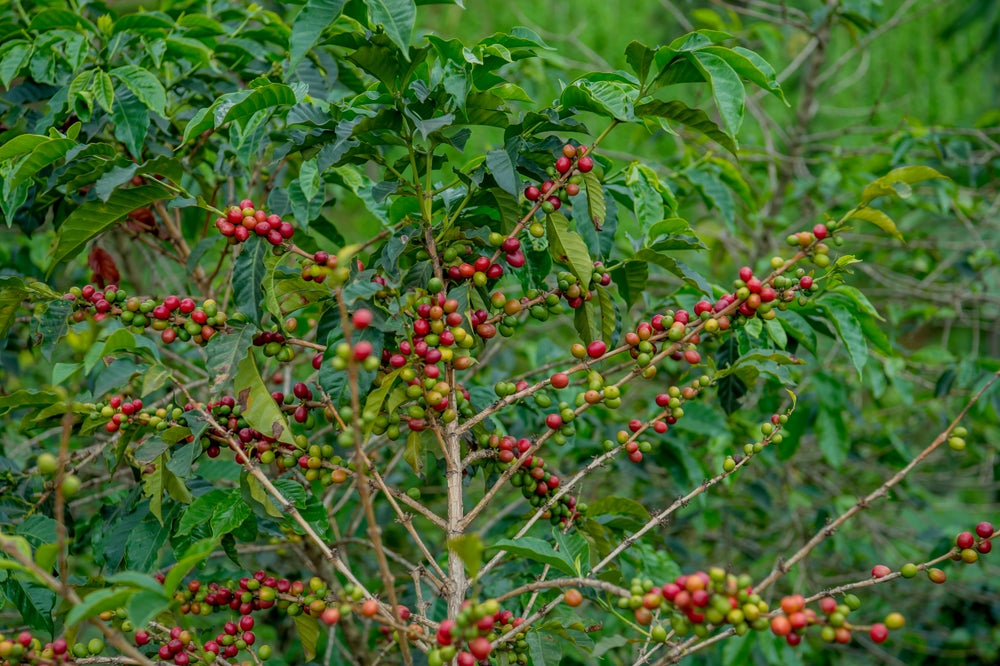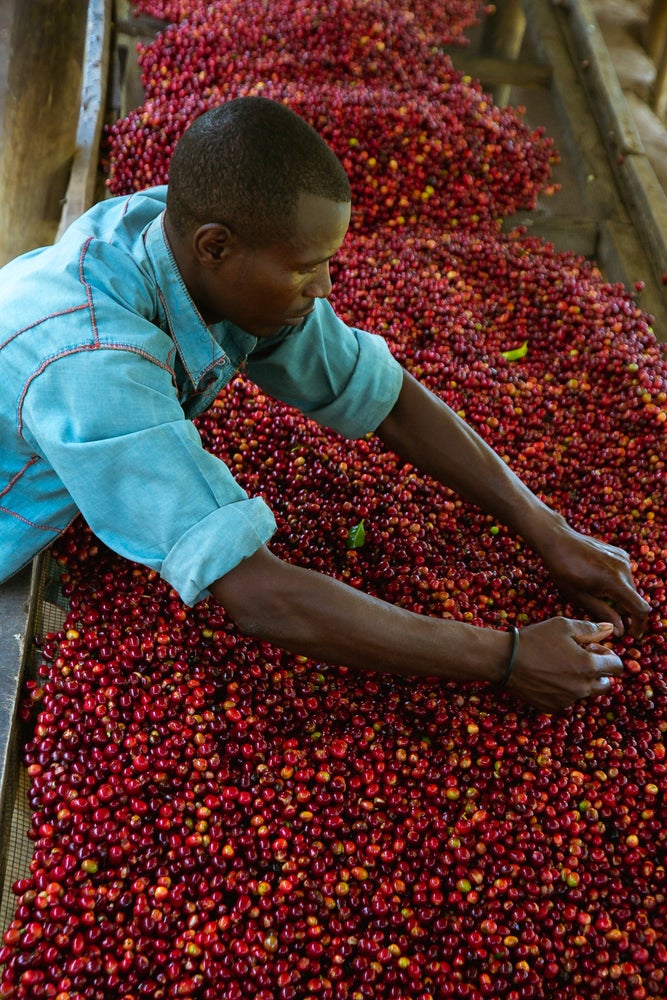About This Coffee
Humure station is unusual in Rwanda as it is managed entirely by women. This year, our in-country partner, Baho Coffee. invested in new washing channels and a large storage unit to help the station produce even more amazing coffees. The station is named after the highest hill in the area, which is a tourist destination as well as spot for many community members. As Rusatira Emmanuel, Managing Director of Baho Coffee, says, “[It’s] like a flag for the area.”
Cultivation
Farmers in Rwanda have small coffee plots, usually around 250 trees. Most coffee trees are intercropped with food crops like maize and potatoes. Despite their small size, for many, coffee remains the main cash crop and their biggest source of income throughout the year.
Washing stations countrywide, including those owned by Baho Coffee, are striving to incentivize high quality coffee production with better prices and support for farmers seeking to improve the quality of their harvest.
In the early 2000s the Rwandan government, with the input of international partners, identified coffee as a potentially key generator of much needed export revenue. To improve the quality of coffee, the government has incentivized the creation of new washing stations in coffee producing areas and has partnered with local stakeholders to make sure that farmers are the main beneficiaries. As one measure to this end, the government supports washing stations by providing inputs. The stations, in turn, transport the inputs from government warehouses to the area so farmers can access them more easily. The station is also involved in training farmers how to use inputs properly.
Humure station supports farmers in a number of other ways as well. The station provides safety equipment such as masks and gloves for farmers to use while applying certain chemicals. Humure also supports farmers with small, year-long loans to help with the costs of production and other expenditures such as medical bills or school fees. The station grows seedlings and distributes them to farmers to help them renew aging rootstock. They provide trainings on hygiene and sanitation and help farmers gain access to clean water.
Humure also organizes Farmer Field Schools (FFS). FFS are groups of 20-30 farmers who live and farm close to one another. The farmers then elect a lead farmer who attends trainings at the station. The lead farmer returns to their area and teaches the group he leads using a centrally located demonstration plot. Through the FFS, farmers learn about soil conservation, water protection, waste management and more.
Harvest & Post-Harvest
During the harvest season, cherry is selectively handpicked by farmers and their families. Humure encourages farmers to sort through their cherry, removing any unripe, damaged or overripe cherry before selling their cherry to the station. At Humure, staff sort cherry by hand and then float the cherry to check for density. The station accepts cherry that passes both visual hand sorting and floating. On average, Humure has 120 seasonal workers who oversee and inspect cherry from intake to pulping to drying and beyond. Sorting work consumes over 70% of seasonal labor, but Rusatira knows it is worth it.
After sorting and intake, cherry is moved to raised beds. Workers rake drying cherry frequently to ensure even drying. Rusatira says he drew inspiration about drying from cooking methods. “When you take meat and you put it on charcoal, after 20 min you have your meat ready. But in an oven, it would take 45 minutes. If you put it in hot ash, it may take two hours. When you taste these three meats, there's a difference in the taste,” he says. “I have this kind of thinking that coffees that dry slowly, the taste and lifespan of this coffee may be longer and more delicious than the coffee that dries for 10-12 days in sun.” In total, the cherry from Bugoyi station dries under careful scrutiny for an average of 47 days.
About Baho Coffee
Rusatira Emmanuel is the founder and owner of Baho Coffee. Rusatira established Baho Coffee in 2013 after a long career in coffee that began as a washing station manager and culminated in a position as head of a department, managing a number of stations. Today, Baho Coffee oversees four washing stations across Rwanda. With one station in each of the coffee producing provinces, Baho Coffee has access to a wide range of profiles and processing methods.
In addition to providing a number of educational, financial and agricultural services to farmers, Baho Coffee also has several social programs that are geared towards helping farmers, especially marginalized groups like women, older farmers and youth.
Rusatira, who was personally affected by the Rwandan genocide that took place in 1994, focuses on helping women because he understands firsthand that many families lost many male members during the genocide. As a consequence, Rusatira explains, many Rwandan families are headed by women. Single motherhood—whether caused by the genocide, lack of access to family planning or other circumstances—is often lonely and isolated. Rusatira’s intention is to bring typically isolated single mothers together and ease that isolation while also providing support and training to help them improve their circumstances.
Rusatira’s plan is to process and sell the coffee from women-led families separately. A key part of this plan is to include not only a wide range of information on the lives and conditions of the women in the group but also to include a letter, written by the women in the group, detailing how their station and their customers can help them overcome specific challenges in their lives.
In addition to his program to help single mothers, Rusatira is also focusing on helping older farmers continue to feel relevant and to support young farmers in establishing and improving their farms. He is confident that Baho Coffee’s impact will continue to grow year after year. “As a small company we’re on a small scale,” he said. “But I keep extending.”
Coffee in Rwanda
Despite its turbulent history, today Rwanda is one of the specialty coffee world’s darlings – for good reason! Our sister company in Rwanda does an amazing job of bringing the best that Rwanda has to offer to roasters around the world.
German missionaries and settlers brought coffee to Rwanda in the early 1900s. Largescale coffee production was established during the 1930 & 1940s by the Belgian colonial government. Coffee production continued after the Belgian colonists left. By 1970, coffee had become the single largest export in Rwanda and accounted for 70% of total export revenue. Coffee was considered so valuable that, beginning in 1973, it was illegal to tear coffee trees out of the ground.
Between 1989 and 1993, the breakdown of the International Coffee Agreement (ICA) caused the global price to plummet. The Rwandan government and economy took a hard hit from low global coffee prices. The 1994 genocide and its aftermath led to a complete collapse of coffee exports and vital USD revenue, but the incredible resilience of the Rwandan people is evident in the way the economy and stability have recovered since then.
Modern Rwanda is considered one of the most stable countries in the region. Since 2003, its economy has grown by 7-8% per year and coffee production has played a key role in this economic growth. Coffee has also played a role in Rwanda's significant advancements towards gender equality. New initiatives that cater to women and focus on helping them equip themselves with the tools and knowledge for farming have been changing the way women view themselves and interact with the world around them.
Today, smallholders propel the industry in Rwanda forward. The country doesn’t have any large estates. Most coffee is grown by the 400,000+ smallholders, who own less than a quarter of a hectare. The majority of Rwanda’s coffee production is Arabica. Bourbon variety plants comprise 95% of all coffee trees cultivated in Rwanda.

